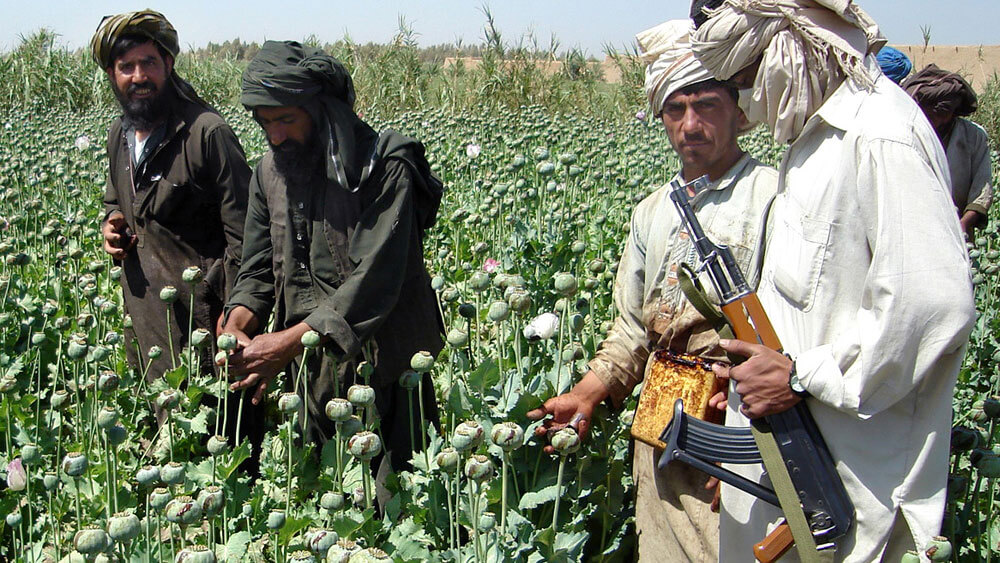With the United States (US) officially ending its longest war in Afghanistan, the Taliban has firmly cemented its position as the country’s new rulers. As a show of its newfound authority, the insurgents have been making diktats as well as promises, with the aim of moulding Afghanistan into its vision of an Islamic society. One such promise made by the group is to crack down on the country’s opium production and drug trade.
During a highly publicised press conference on August 18, Taliban spokesman Zabihullah Mujahid said that there “will be no drug production [and] no drug smuggling” under the Taliban’s rule. “Afghanistan will not be a country of cultivation of opium anymore, but we need international help for that. The international community needs to help us,” he declared.
Mujahid’s plea to the global community to help the Taliban in ending Afghanistan’s drug menace is part of recent efforts by the group to gain international legitimacy. In this respect, it has promised to respect women’s rights, avoid revenge killings, and vowed not to allow Afghanistan to be used as a terrorist base.
Also Read: The Taliban Could Reverse Two Decades of Progress in Women’s Education in Afghanistan.
Moreover, the militants hope that a ban on opium production would project it as a responsible international actor, especially since much of the world, including the US and the European Union, has vowed not to deal with the Taliban and to cut off any aid to the country under its regime. Since Afghanistan is heavily reliant on international development assistance to run its economy, the group’s announcement to ban drugs could also be seen as an effort to ensure that aid is not stopped and that sanctions are lifted. Since 2001, Washington has been leading a billion-dollar effort to wipe out Afghanistan’s illicit drug market. By banning the production and sale of opium, the Taliban hopes that its policies are in line with US and United Nations (UN) efforts aimed at combating global drug trafficking.
However, the Taliban may find that sustaining a ban on the drug business in Afghanistan is not a feasible prospect, both in the context of the Afghan economy and in filling its own coffers.
According to the United Nations Office on Drugs and Crime (UNODC), Afghanistan accounted for 85% of the global opium production in 2020. Furthermore, according to estimates, the opium poppy is the country’s most valuable cash crop, worth around $863 million, and occupies around 263,000 hectares of land. The crop also employs more than 500,000 people, more than any other industry in Afghanistan, and the opiate economy alone is worth over 10% of Afghanistan’s GDP.

The last time the Taliban tried banning opium production, it did not turn out well for the group. The decision to prohibit poppy cultivation in 2000 mired Afghan farmers in unsustainable levels of debt and led to an unemployment crisis. Given that Afghanistan is facing an economic crisis, a ban on the crop could lead to a collapse of the Afghan currency, especially since the international community is withholding billions of dollars in aid.
Therefore, the significance of the crop to the Afghan economy means that the Taliban cannot afford to stifle its production. Additionally, a ban on its cultivation would close a major source of revenue for the group.
After it was removed from power in 2001 by the US and allies, the Taliban has heavily relied on proceeds from drug trade to fund its 20-year-long insurgency. The Taliban ran a widespread taxation network in areas under its control since 2001 and the drug business proved to be the most lucrative for the group. Reports suggest that the Taliban levied a 10% tax on opium farmers and imposed additional taxes on laboratories converting opium into heroin.
Given the significance of the trade to the Afghan economy, it is no surprise that drug money contributed to around 60% of the Taliban’s revenue. According to the UN Security Council (UNSC), narcotics trade alone represented “the most significant source of income for the Taliban,” with the group’s annual earnings from the industry estimated at around $100-400 million. The UNSC also notes that while heroin cultivation and production “provided the bulk of Taliban’s revenue for many years,” the emergence of drugs like methamphetamine is “giving impetus to a major new drug industry with significant profit margins.”
Moreover, the US’ failed efforts to destroy the Afghan drug trade between 2001 and 2021 show that eradicating the narcotics business is no easy feat, even for a superpower. Although US spent around $9 billion on the war on drugs in Afghanistan, opium production continued to rise. In fact, according to the UNODC, opium production reached its peak in 2017, as it “increased by 87 per cent to a record level of 9,000 metric tons,” compared to 2016 levels.
Therefore, given the US’ failure to dismantle the drug trade, and the profitable revenue margins offered by the business, it is highly unlikely that the Taliban will follow through on its promise of banning the production of opium in Afghanistan. Hence, it is not surprising to note that the group allowed for the opium business to continue during the late 1990sm despite banning the use of hashish and cigarettes under the pretext of Islamic principles.
The fact that a group known for its extreme interpretation of Islam resorted to tweaking its values for monetary gains proves that the Taliban is inherently a rational actor. While the group is guided by an Islamist ideology, it has shown no qualms in being a little flexible in safeguarding its rule and protecting vital economic interests. Hence, it would not be surprising if the Taliban walks back on its pledge to ban drugs and opts to reap the benefits of the lucrative narcotics trade.

